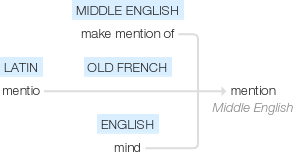Mention
Middle English (originally in make mention of ): via Old French from Latin mentio(n- ); related to mind.
wiktionary
From Middle English mencioun, mention, from Old French mention, from Latin mentiōnem, accusative of mentiō(“a mention, calling to mind”).
etymonline
mention (n.)
c. 1300, mencioun, "a note, a reference, a calling to mind by speech or writing," from Old French mencion "mention, memory, speech," from Latin mentionem (nominative mentio) "a calling to mind, a speaking of, a making mention," from root of Old Latin minisci "to think," related to mens (genitive mentis) "mind," from PIE root *men- (1) "to think." From late 15c. as "statement about or in reference to a person or thing," which by mid-18c. had diminished to "incidental or casual reference," though in military use a mention in the dispatches remained an important thing.
mention (v.)
"make mention of, speak of briefly or cursorily," 1520s, from mention (n.) or else from French mentionner, from Old French mencion. Related: Mentioned; mentioning. Not to mention as a "rhetorical suggestion that the speaker is refraining from presenting the full strength of his case" [OED] is by 1690s. Don't mention it as a conventional reply to expressions of gratitude or apology is attested from 1840.
